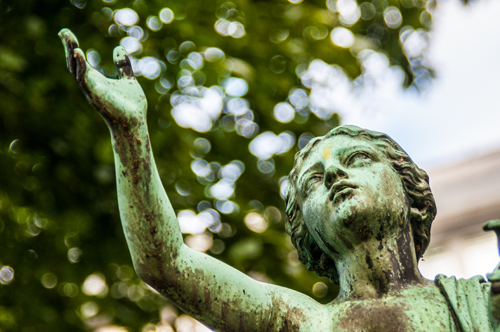 One icy Saturday in January 1980, my father and I were loading firewood into the back of the family station wagon when his face, red from the cold wind and exertion, suddenly drained of color and turned as gray as the crusted snow under our boots. He slumped onto the car’s tailgate and pulled from his pocket the battered aluminum pill vial he carried everywhere with him. He slowly shook out a tablet, placed it under his tongue, and released a massive sigh. “Not a word of this to your mother,” he told me, the blood coming back to his cheeks and nose. It wasn’t the first time I had seen the effects of a mini heart attack, but it was the first time I’d thought he was going to die.
One icy Saturday in January 1980, my father and I were loading firewood into the back of the family station wagon when his face, red from the cold wind and exertion, suddenly drained of color and turned as gray as the crusted snow under our boots. He slumped onto the car’s tailgate and pulled from his pocket the battered aluminum pill vial he carried everywhere with him. He slowly shook out a tablet, placed it under his tongue, and released a massive sigh. “Not a word of this to your mother,” he told me, the blood coming back to his cheeks and nose. It wasn’t the first time I had seen the effects of a mini heart attack, but it was the first time I’d thought he was going to die.
It was a scene that would replay itself frequently over the next few years. Dad would exert himself, then he’d slump, pop a nitro, and bounce back. Over time it took less exertion to bring on an incident. The wood loading gave way to walking a golf course, which gave way to going up a flight of stairs, which gave way to standing up. The guy is on borrowed time, my five siblings and I agreed. Dad’s mother had died of a “massive coronary,” as he called it, at age 50, and he, well into his 60s, was less of a ticking bomb than a tire with a slow leak. We started talking about what would become of Ma when he died—who she’d live with or whether she’d move back into Boston to be nearer the cultural attractions she loved but no longer got to see for fear of leaving Dad alone.
His first heart bypass was supposed to circumvent four closed blood vessels, but when the surgeons opened him up, they decided they needed to work on five. A few years later, despite a drug regimen and a steady diet of cauliflower and lo-cal salad dressing, he needed to have a stent inserted in one of the suddenly clogged bypasses.
Wills were rewritten. Executors and trustees were named. Papers were organized and put in a secure place. We made sure Ma could safely operate the Ford Taurus Dad alone was allowed to drive. Phone trees were widened, nearby cousins added to the list of people we would call when the time came.
And still he lived. We started calling him the Bionic Man because it seemed that no matter what befell him, like Steve Austin, he just kept going. When my sister called late one night after another hospitalization and said somberly, “Come see your father,” I didn’t go. I knew he’d be okay.
So it came as a shock on another cold winter day, this time in 2005, to realize that Ma was not going to outlive Dad. She was the heart and soul of our family, the rock who could always be counted on for good advice, a smile, and a hug. But there she was, her strong swimmer’s body ravaged by Parkinson’s disease, wasting away in a hospital bed but still able to tear into a box of Russell Stover chocolates with my five-year-old son by her side. It hit me like a gut punch: She’s dying.
A couple of weeks later, my brother called to tell me she had died. I thought to myself, it wasn’t supposed to happen like this, not in this order. But I never said it aloud because our father was still with us.
For the first time in his 86 years, Dad lived alone. I dropped in on him one summer afternoon to find him asleep in his recliner, the Red Sox game on at full volume. I gently woke him, expecting him to be happy to see me. Instead he asked what I was doing there, almost angry that I had interrupted his afternoon. I showed him some pictures I had taken in Normandy, where he had been an Army translator. He wasn’t interested.
About a month later, my sister called again from a hospital and said, “Come see your father.” He had fallen and broken his hip, and the doctors said his heart was too frail to withstand surgery. I told her I was on my way, but before I could pack a bag, she called back to say he had just died.
I gave a eulogy about how remarkable an unremarkable life can be and how I understood my father better in his later years now that I had kids of my own. When I got home from the funeral, I saw that my kids had left a pile of pillows and blankets in the front hallway, remnants of a fort built to protect them from imaginary enemies. I lay down in that pile and felt something completely unexpected. I had been preparing for this moment for 26 years, thinking it could come at any time. And now that it was here, I was overwhelmed with grief. Without him, and without her, I was a different person. As sleep washed over me I thought, “They’re both gone. I’m an orphan now.”
Click here to see Rose’s tips for healthy and happy relationships

